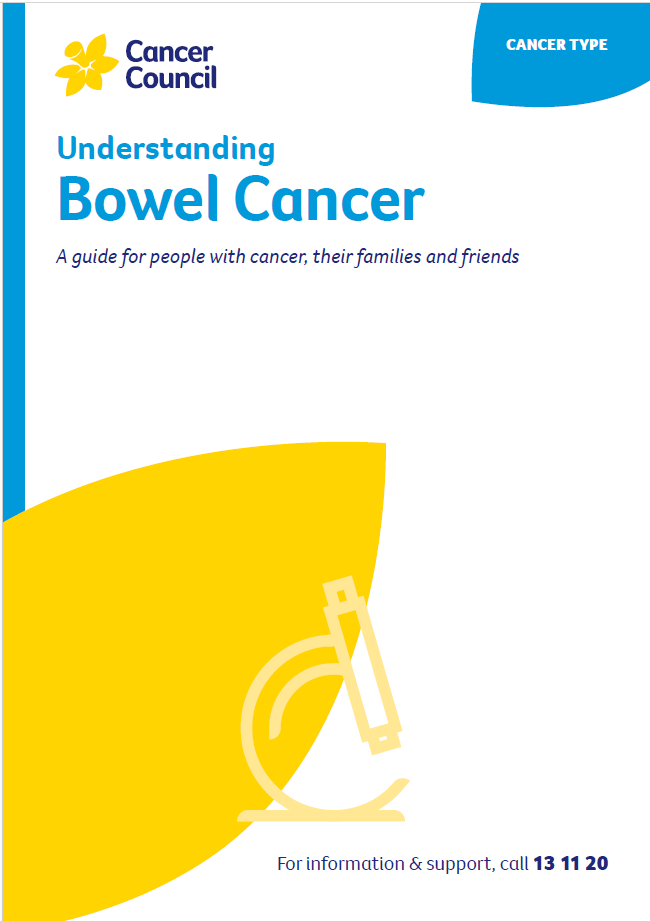- Home
- Bowel cancer
- Managing side effects
- Managing bowel and dietary changes
- Eating after treatment
Eating after treatment
Immediately after treatment – particularly surgery – you may be on a modified diet. What you are able to eat might depend on the type of surgery you’ve had, how much of your bowel was removed and whether you have a stoma.
Learn more about:
Overview
During and after treatment, you may find that certain foods upset your bowel, and cause diarrhoea or wind. YYour health care team may suggest foods to avoid, but as foods can affect people differently, you will need to experiment to work out which foods cause problems for you. It is better to limit – not exclude – these foods in your diet, as you may find that what you can handle improves over time.
Keeping a diary of what you eat can help. Make a note of the foods that cause constipation, diarrhoea or wind. Your ability to handle different foods usually gets better with time but can take many months. When returning to your usual diet, introduce one food at a time. If something causes a problem, try it again in a few weeks to see if your response has improved. Share this information with the health care team as it can help them figure out how to manage any issues.
For more information on eating well during and after cancer treatment, see Nutrition and cancer.
Eating with a stoma
If you have a stoma, you may need to change what you eat at first to help the stoma settle. Eating a diet of bland, soft, low-fibre food for the first 4–6 weeks will help – the stoma hole is swollen at first so the opening is narrower. Foods that irritate the stoma vary from person to person.
Sometimes food can build up and cause a blockage, stopping solids, fluids and gas moving through. You may need to change what and how you eat (see below) to help avoid this. A stoma blockage can be uncomfortable and cause a bloated feeling or nausea. If symptoms of a blockage last for 2 hours or you vomit, contact your nurse or hospital.
How much waste comes out depends on how, what and when you eat. Over time, most people find they can eat a normal healthy diet. If you have concerns, talk to a stomal therapist or ask to see a dietitian. Bowel Cancer Australia on 1800 727 336 has recipes for people recovering from surgery or with a stoma.
Ways to manage stoma blockages
- Eat regular meals.
- Avoid eating a large amount of food at one time.
- Try to maintain a balanced diet so your body gets the nutrients it needs.
- Drink 8–10 glasses of fluid a day to stay well hydrated.
- Cut food into small, bite- sized pieces, and chew slowly and thoroughly.
- Limit high-fibre foods, raw vegetables, the skin on fruit and vegetable, nuts, seeds, kernels (e.g. corn, popcorn) and sausage skins. These foods are more likely to cause blockages.
- If you have trouble eating certain foods, talk to a dietitian about alternatives.
- You may find cooked foods easier to digest.
- Try new foods one at a time, in a small amount, and note any reaction. If it doesn’t irritate the stoma, try a larger amount next time.
- Massage your belly and the area around the stoma. Lie on your back, pull your knees up to your chest and roll from side to side. This may help move a blockage through the stoma.
→ READ MORE: Life after treatment for bowel cancer
When I first got put back together after the ileostomy, processed food really messed with me. The more processed it is, the slower my body deals with it. Some of the things I loved – pizza, processed meat, bread, red meat and potato – play with me. The greener the better – salads fruit, fish, chicken really make me feel sensational.
Richard
Podcast: Appetite Loss and Nausea
Listen to more episodes from our podcast for people affected by cancer
Video: How to eat well after a cancer diagnosis
More resources
Prof Alexander Heriot, Colorectal Surgeon and Director Cancer Surgery, Peter MacCallum Cancer Centre, Director, Lower GI Tumour Stream, Victorian Comprehensive Cancer Centre, VIC; Dr Cameron Bell, Gastroenterologist, Royal North Shore Hospital, NSW; Graham Borgas, Consumer; Prof Michael Bourke, Director of Gastrointestinal Endoscopy, Westmead Hospital, The University of Sydney, NSW; Laura Carman, 13 11 20 Consultant, Cancer Council Victoria, VIC; Amanda Connolly, Specialist Bowel Care Nurse, Icon Cancer Centre Windsor Gardens, SA; A/Prof Melissa Eastgate, Operations Director, Cancer Care Services, Royal Brisbane and Women’s Hospital, QLD; Anne Marie Lyons, Stomal Therapy Nurse, Concord Repatriation General Hospital and NSW Stoma Ltd, NSW; Lisa Nicholson, Manager Bowel Care Services, Bowel Cancer Australia, NSW; Stefanie Simnadis, Clinical Dietitian, St John of God Subiaco Hospital, WA; Rafi Sharif, Consumer; Dr Kirsten van Gysen, Radiation Oncologist, The Nepean Cancer and Wellness Centre, NSW; Sarah Williams, Clinical Nurse Consultant, Lower GI, Peter MacCallum Cancer Centre, VIC.
View the Cancer Council NSW editorial policy.
View all publications or call 13 11 20 for free printed copies.

